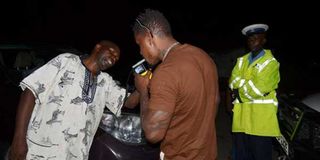NTSA says ruling on Alcoblow makes it hard to deal with drunk drivers

A motorist takes a breathalyser test for alcohol. The NTSA says it intends to file a new lawsuit to have last week’s Court of Appeal verdict on breathalyser rules clarified. FILE PHOTO | NATION MEDIA GROUP
What you need to know:
- Judges found that the law that introduced the use of breathalyser is inconsistent with the Traffic Act.
- The judges had faulted the fact that mere rules cannot amend statutory provisions.
- But they said there is need to prohibit drink-driving because it is a big problem on Kenyan roads.
A fresh battle on drink-driving still looms even as drunk drivers celebrate a verdict that found rules on breathalysers, popularly known as Alcoblow, incapable of sustaining a charge against anyone.
The National Transport and Safety Authority (NTSA) says it intends to file a new suit to have last week’s Court of Appeal verdict clarified, arguing that it has consequently put into disarray the agency's expectations on executing its mandate on the roads when dealing with drunk drivers.
According to NTSA Director-General Francis Meja, appellate judges GBM Kariuki, Fatuma Sichale and Festus Azangalala ruled that the breathalyser rules do not create an offence independent of the Traffic Act.
“We will definitely move to court under a certificate of urgency over that judgment,” he said.
LAW INCONSISTENT
Even though the three-judge bench shied away from declaring the rules unlawful or unconstitutional, they found that the law that introduced the use of breathalysers is inconsistent with the Traffic Act, and hence cannot be used to enforce charges.
“No one can be charged under rule 3(1) of the breathalyser rules. It does not reinforce the provisions of the Traffic Act as was intended,” they ruled.
The judges had faulted the fact that rules alone cannot amend statutory provisions considering that the breathalyser rules do not make it an offence to drive after consuming alcohol beyond the prescribed limits.
However, they pointed out that there is a need to prohibit drink-driving because it is a big problem on Kenyan roads.
They called for quick, proper legislation to curb the vice.
Some of those arrested over the weekend for drink-driving were charged in court on Monday, freed and even had money they had paid as cash bail returned to them.
This is a trend that may be replicated in other courts countrywide.





